 |
ICHARM Newsletter International
Centre for Water Hazard and
Risk Management under the auspices of UNESCO
Vol.1-No.1 March 2006
| 
|
In our periodical newsletter, we continue our
focus on providing our national and international partners and colleagues with
up-to-date information on the progress of our activities at ICHARM. (Click
here for back numbers of UNESCO-PWRI newsletters) |
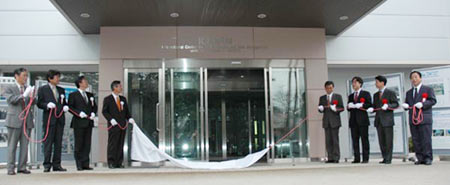
Unveiling ceremony at the front entrance of the ICHARM
building
|
| On 6th March 2006, the International Centre
for Water Hazard and Risk Management under the auspices of UNESCO (ICHARM) was
officially launched in the Public Works Research Institute (PWRI), Tsukuba, Japan.
The goal of the centre is to be the world Centre of Excellence to provide best
practicable strategies to localities, nations, regions and the globe to manage
the risk of water related disasters including flood, drought, landslide, debris
flow, storm surge, tsunami and water contamination. |
| 1.
Message from Dr.Takeuchi, Director of ICHARM It
has been three years since ICHARM was proposed by UNESCO Director-General Koichiro
Matsuura in agreement with the Japanese government on the occasion of the Ministerial
Conference of the Third World Water Forum. I t is my great pleasure to announce
the official launch of ICHARM today (March 6, 2006). I would like to express deep
appreciation to those who made so much effort to establish the centre; especially,
to those from UNESCO, the Japanese Ministries of Land, Infrastructure and Transportation,
of Foreign Affairs, and of Education, Culture, Sports, Science and Technology.
I have been appointed as the founding Director of ICHARM, and I feel quite honored
to be given such a responsible and challenging position. I assure that all ICHARM
staff, myself included, will make every possible effort to achieve the goal of
the centre, and I would like to ask all parties concerned to support us in doing
so. The idea of ICHARM originated from the worldwide
necessity for taking measures against water-related disasters, which have been
characterized by increasing severity in recent years. Natural disasters, such
as flood, storm surge, landslide as well as drought, cause serious social problems
and impede economic development in many countries. Following the efforts being
made by United Nations, such as the International Decade for Natural Disaster
Reduction (IDNDR) and the International Strategy for Disaster Reduction (ISDR),
the preparation of the International Flood Initiative (IFI) was started by UNESCO
and WMO in 2002. (At the United Nations World Conference on Disaster Reduction
held in 2005, IFI was formally established by UNESCO, WMO and the United Nations
University.) Under such circumstances, preparatory activities of ICHARM progressed
while the world showed a high expectation of the center's future contributions
in the field. ICHARM, as a UNESCO category 2 centre, is the world's only institute
which targets water-related disasters. I believe that
ICHARM's goal is to address the very core of individual disasters and present
the best practicable solutions based on the situations of local communities. To
implement activities based on localism such as this, a solid alliance is essential
as well as cooperation from various organizations throughout the world. ICHARM
alone may not be able to contribute much to the world. I am sure, however, that
ICHARM can make a great contribution by carrying out activities that nurture synergy
among each other, and by building a network of experts and organizations around
the world. We are planning to hold the first ICHARM
International Symposium at the United Nations University in Tokyo on 14th September
this year. It will be a great opportunity for us to introduce our activities both
domestically and internationally as well as to hear any comments or proposals
you may have regarding ICHARM. We greatly appreciate your continued support for
our activities. 
Director of ICHARM
Dr. Kuniyoshi TAKEUCHI
|
Profile
of Dr. Takeuchi 1968 MS in Civil Engineering
from University of Tokyo, Japan
1972 Ph.D in Ciyt and Regional Planning
from University of North Carolina at Chapel Hill,USA
1982 Dr. Eng. in Civil
Engineering from University of Tokyo, Japan
1982 Professor in Faculty of
Engineering, University of Yamanashi, Japan
2003 Professor in Interdisciplinary
Graduate School of Medical and Engineering, University of Yamanashi, Japan
1998--2000 Chairman of the Inter-Governmental Council of UNESCO
International
Hydrological Programme (IHP)
1998--2000 Deputy President of International
Water Resources Association (IWRA)
2001--2005 President of International
Association of Hydrological Sciences (IAHS)
2000-- Chairman in Japan National
Committee for the UNESCO
International Hydrological Programme (IHP)
| 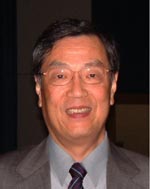
Dr. Takeuchi,
Director of ICHARM
|
2. Activities
of ICHARMGoal To
be the world Centre of Excellence to provide best practicable strategies to localities,
nations, regions and the globe to manage the risk of water related disasters including
flood, drought, landslide, debris flow, storm surge, tsunami and water contamination.
Guiding Principle -
To be needs driven rather than supply driven, responsive to respective local realities. -
To prescribe tailored strategies to realize
integrated risk management under the multifaceted social, economical, institutional
and cultural conditions as well as technological availability. -
To produce policy effective information and
raise public awareness to promote societal action. -
To promote Research Development and Capacity Building jointly, to bring science
where most needed. -
To work in
alliance with all the related organizations of the world to mutually complement
resources and expertise and to create synergy in implementation. -
To serve as a think-tank of water hazards and
risk management of the world and play a central role of its strategic promotion.
Management Strategy -
To be the clearinghouse of information and the broker of knowledge and technology
of the world to deliver whatever available to wherever needed in the world. -
To make the Japanese and PWRI experiences and
human network available world wide. -
To promote joint work with researchers and engineers in developing countries in
alliance with universities and related institutes worldwide. -
To function, in substance, as a UNESCO Centre with internationally recruited staff
and English as an operation language. -
To promote external fundraising jointly with the researchers and administrators
of various nations and international institutes.
Activities for the present Initially,
ICHARM will place our priority on “risk management regarding flood-related
disasters”. Specifically, the centre conducts activities of “research,
training and information networking.” Based on the Japanese and PWRI's experiences
and technologies, the centre integrates and carries out those activities in active
collaboration with relavant organizations in Japan and abroad. 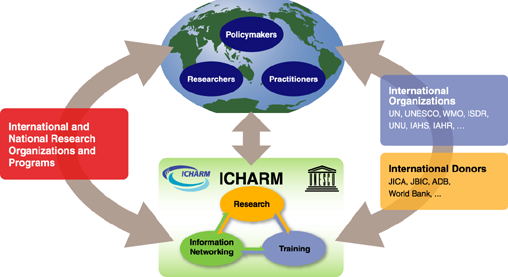
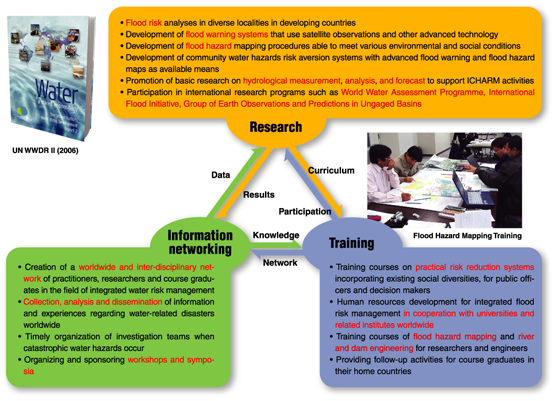
|
3.
Signing ceremony at UNESCO Headquarters 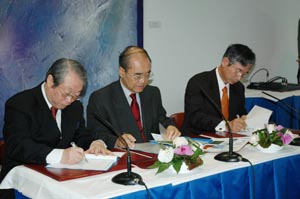
Scene from the signing ceremony (Left to right:
Mr. T.Sato, Mr. K.Matsuura
and Dr. T.Sakamoto) Two agreements
(between the government of Japan and UNESCO, and Japan's Public Works Research
Institute and UNESCO) for the launch of the International Centre for Water Hazard
and Risk Management (ICHARM) were signed by the Director-General of UNESCO, Koichiro
Matsuura, the Permanent Delegate of Japan to UNESCO, Ambassador Teiichi Sato and
the Chief Executive of PWRI, Tadahiko Sakamoto on 3 March 2006 at UNESCO Headquarters.
Prior to the signing ceremony, Mr. Matsuura held bilateral talks with Dr. Sakamoto,
during which he expressed his gratitude to the Japanese government and PWRI for
their continued support for the establishment of the centre. He expressed the
hope that ICHARM would develop links and work closely with the network of the
already existing UNESCO water-related centres, and that it would be a real international
hub of activity in the area of water sciences. |
4.
ICHARM opening ceremony 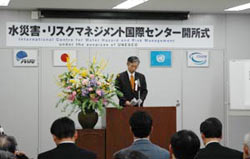
Opening address by Dr. Sakamoto
Following
the signing ceremony at UNESCO Headquarters on 3rd March, The opening ceremony
of ICHARM was held at PWRI's auditorium in Tsukuba, Japan, on 6th March 2006. There
were about 100 participants in the opening ceremony. Many of them were from governmental,
prefectural, and municipal offices, who were invited to attend the ceremony; among
them were Mr. Oshida (Deputy Director-General, River Bureau), Mr. Mochizuki (Director-General,
National Institute for Land and Infrastructure Management), Mr. Nishida (Multilateral
Cultural Cooperation Division, Public Diplomacy Department, Ministry of Foreign
Affairs), Mr. Ishida (Chief, Planning Coordination Office, International Affairs
Division, Commissioner's secretariat, Ministry of Education, Culture, Sports,
Science and Technology), to name a few. At
the opening of the ceremony, Dr. Sakamoto, Chief Executive of PWRI, explained
how ICHARM came to be established and what contribution it will make to the world,
and also expressed his gratitude to organizations and institutions that provided
support for the establishment of ICHARM. Then Mr. Oshida, on behalf of Mr. Kitagawa,
Minister of Land, Infrastructure and Transportation, made a congratulatory speech
on ICHARM's official launch. Subsequently Mr. Nishida on behalf of Director of
Multilateral Cultural Cooperation Division, Public Diplomacy Department, Ministry
of Foreign Affairs, Mr. Ishida on behalf of Secretary-General of Japan National
Committee for the UNESCO and Mr. Mochizuki, also delivered congratulatory addresses. Then
in front of the new ICHRM building, the ICHARM plate hanging above the entrance
was unveiled by the guests and executives of PWRI with others giving a congraturatory
applause. Dr. Takeuchi, appointed as the founding Director of ICHARM, addressed
his first speech on the goal, guiding principles, management strategies and initial
activities of the new centre. At last, the
flags of Japan, the United Nations and PWRI were hoisted in front of the PWRI
main building to complete the ceremony. |
5. Latest activities (International Workshop on Flood Risk Management, 24-25th
January 2006) 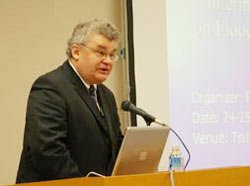
Dr. Szollosi-Nagy, UNESCO
The
International Workshop on Flood Risk Management co-hosted by PWRI, UNESCO and
WMO was held at the Tsukuba International Congress Center (Tsukuba, Japan) on
24-25th January 2006. The aim of the workshop was to discuss the future plan of
ICHARM activities and implementation measures of IFI with experts, researchers
and administrators from home and abroad, based on the present state and future
trend of flood risk management in the world. The following is the summary of the
workshop. Session
1: Risk Assessment and Monitoring 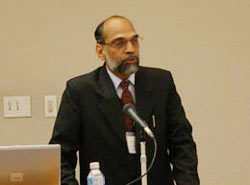
Dr. Tyagi, WMO
Mr. Yoshitani, principal researcher
of the Secretariat for Preparatory Activities of UNESCO-PWRI Centre (Disaster
Prevention Research Team at present), presented ICHARM's plan of information networking.
After his presentation, participants discussed a number of ideas about ICHARM.
Some expected the center to play a role as the clearinghouse of information which
are useful for both policy making and technical cooperation. Some requested that
the center should collect information about not only disasters but also social
situations behind them. Still others disscussed issues about alliance with other
organizations and how to handle vulnerability which directly affects risk evaluation. Session
2: Early Warning/Forecasting and Real-time Observation
Mr. Fukami,
principal researcher of the Hydrologic Engineering Research Team, delivered a
presentation on flood forecasting system. Then opinions were exchanged regarding
flood warning and forecasting systems using satellite precipitation data for local
areas where few hydrological land data is available, and about the Global Flood
Alert System (GFAS), which is the framework of information service on flood risk
promoted by the International Flood Network (IFNet) . Session
3: Governance/Integrated Flood Management
As a lesson learned
from the case of Hurricane Katrina, it was pointed out that quite a few people
did not evacuate even though they were warned of high risk of water-related disasters,
and that it is essential to enhance residents' awareness toward disaster prevention.
The recommendation of “the International Master Course on Flood Modeling
for Management” by Dr. Price from the UNESCO-IHE Institute for Water Education
, which is a preceding organization under the auspices of UNESCO, drew much attention
from the participants. Session 4: Capacity
Building and Technical Information Sharing
Mr. Tanaka, principal
researcher of the Secretariat for Preparatory Activities of UNESCO-PWRI Centre
(International Technical Exchange Team at present) reported on the activities
of the Flood Hazard Mapping training course , which was implemented by PWRI with
support form JICA. The presentation was followed by opinions that it is important
to cooperate with other related organizations and universities. Session
5: Technical Assistance
Mr. Fukami delivered a presentation on
technical transfer for flood damage mitigation, and received opinions that to
transfer advanced Japanese techniques to other countries is important, but more
important is to transfer techniques that are tailored to the situation of each
country. At last, the general deliberation
chaired by Dr. Takeuchi was held and the workshop ended successfully. ICHARM will
incorporate insightful opinions expressed by the workshop participants into its
future activity plan, and continue making efforts to promote an international
alliance in order to prevent and mitigate water-related disasters.
|
6. Organization of ICHARM and new contact numberAt
the reorganization of PWRI on 6th March 2006, the Secretariat for Preparatory
Activities of UNESCO-PWRI Centre was removed, and the International Centre for
Water Hazard and Risk Management under the auspices of UNESCO (ICHARM) was established. The
centre consists of one Group (Water-related Hazard Research Group) and three Teams
(International Technical Exchange Team, Disaster Prevention Research Team and
Hydrologic Engineering Research Team). New contact numbers and e-mail addresses
are as follows: 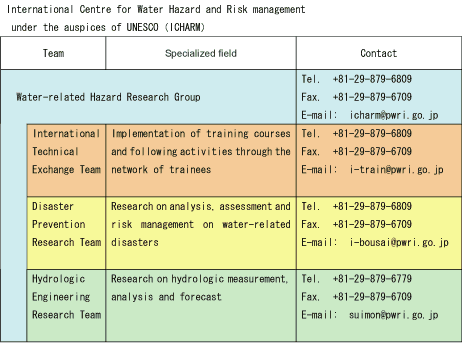
| Information ICHARM newsletters are
distributed via e-mail. They can also be downloaded from our website. To subscribe
or unsubscribe to our mailinglist, please contact us via e-mail. We welcome any
comments or requests from you to help us make this newsletter more effective and
informative. Issued by: International Centre for Water Hazard
and Risk Management under the auspices of UNESCO (ICHARM) 1-6
Minamihara Tsukuba Ibaraki 305-8516, Japan Tel: +81-29-879-6809 Fax: +81-29-879-6709
e-mail: icharm@pwri.go.jp
URL: http://www.icharm.pwri.go.jp/ |
| | |





